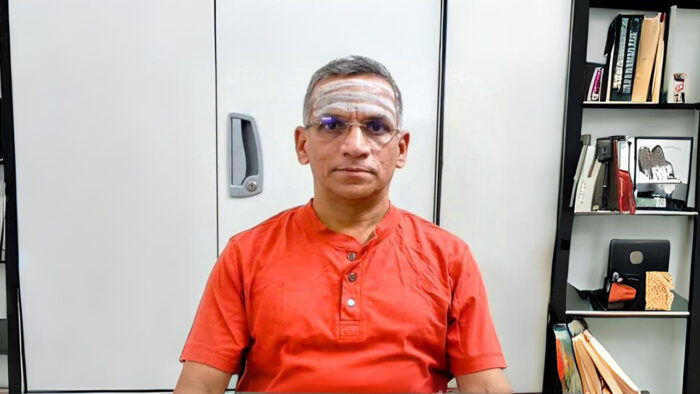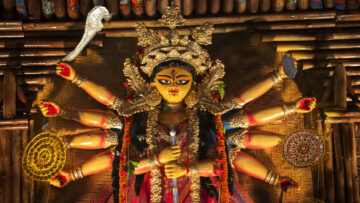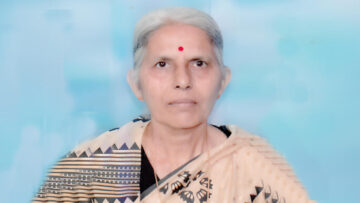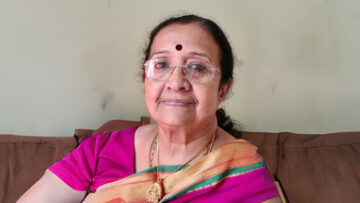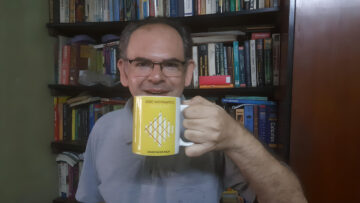At the Tantra conference recently held by Indic Academy, Sri K Giridhara Sarma spoke on the topic of ‘Śrīvidyā as a Darśana’.An Electronics engineer by profession, Sri Giridhar Sarma was taught the basics of Tarka and Mimamsa by the great scholar Sri Goda Venkateswara Sastrigal and he has also specialised in Mimamsa and Vedanta including the study of Prashtānatraya Bhāshya and other important texts. He was initiated into Śrīvidyā upāsana by his guru and was given upadeśa as well as training in Shāktā and Shiva āgamas.
What was your initiation into Vedānta, Mimāmsa and Śrīvidyā upāsana? Did one flow into the other or was there any special incident which made you gravitate to Śrīvidyā?
I first went to my guru to study Vedānta. I was ‘less than zero’ in terms of skills/facility in shāstram when I started. Due to his personal and constant guidance, I got confidence quite soon. He said my progress was relatively fast but he told me that only much later in life. There were several phases of feeling inadequate and insecure, overcome only by the strength he gave me.
At one point, I summoned courage to ask him to teach me a few books from a wish list I had made by listening to other scholars speaking in scholarly sadas and also by reading some commentaries of the books he taught me. Till that time, he decided what to teach, and besides I did not even know the books that existed on the topic. One day he bought me the Panchapādikā vivaranam book and asked me to come for that class. I went to the library and searched about Panchapādikā. Those are pre-Google days. My Guru decided what I would read. I took it all in , without questioning.
Anyway, I made a wish list and asked him what I should do to learn those. He told me that I have to study Mimāmsa before I can attempt to read them. The next day he gave me his copy of a Mimāmsa book and started the classes. I asked if I was eligible to study. He said NO, but that he was there to make me eligible and my job is to study! That was the kind of handholding I had.
Getting into Śrīvidyā was natural. I did not ask him. Nor did he reveal any plans. He used to do Chandi Homam and sadas on his Guru’s birth anniversary every year. Even now, his sons are continuing that tradition. The advantage was that everyone got to participate and I took up certain tasks myself just to please my guru. That was my focus. Not to please Divine, which was more of an abstract concept at that time. I could not do certain tasks without knowing the prayogam so I would ask him. Also, if I offered to do something, he would ask me if I knew how to do it. Since I might have observed others doing it and would say yes, then he would ask me if I knew the philosophical significance of the act, which I obviously would not know. Then he would take his book, ask me to read a passage and explain. This would happen as I would be leaving to go to the market to get some stuff or as we would be arranging puja sāmagri or homa sāmagri. And he would continue to explain while going on scooter or while having dinner. Many were the days I would be asked to stay and have food before leaving.
So, you see, the teaching and learning was more informal, personal, tailor-made and significant. The profundity of all that dawned upon me much later in life, not when I was learning from him. But I always believed that whatever he was telling me was extremely important and I have to take it in. The processing happened much slower, but I did take it all in.
Also he started teaching me from books on Kashmir Shaivism. I still believe, apart from Advaita, he was more partial to that branch of philosophy than anything else. The emotion, spontaneous outpourings of joy and the power of his lessons while learning Pratyabhijñā, still stays with me and I would say that is a guiding light in dark times that would sometimes arise during contemplation.
The ritualistic part of Śrīvidyā was more of a completion of formality for what he had already taught me and he did not emphasize any rigorous practice for me. That suits my contemplative and bookish nature, if I have to say it positively, and my laziness, if I have to be candid.
He said that he did not have a rigid plan for me and based on my progress and his analysis of my strength and weakness, he prescribed books, practices, mantra etc, much like a Ayurvedic physician who gradually but purposefully works on a patient by eliminating or balancing doshās and assisting the system to strengthen itself. Maybe that is why we call Iswara, who is not different from Guru, as prathamo devyo bhiṣak.
How is the experience of the Ultimate reality different in our different darśanas? It is described differently but is the experience different according to you?
I would be cautious in answering a question that contains words like ultimate! Books are there. They are written by different people for different sets of readers at different points in time. We have to connect to what is acceptable to our heart. Not intellect. And that cannot be more than one at any given point. And as a person matures, it might change also. I find solace in Advaita without conflicting or contradicting any other darśanas – particularly Śrīvidyā or Kashmira Shaivam as I enjoy them but I am more comfortable with Advaita.
Is it true that because the world at large tends to see the Divine Power as Masculine, it is difficult to see Her as being the source of that Power, except for the Shāktās.
We see power without any gender attributes. Say we talk about power of a machine, money power, political power, and such cases – there is no attribute. It may be that Divine Power is perceived masculine by religions/paths that have a male figure-head as God. It is mostly mental conditioning. Now with emphasis on political correctness in normal communication also, we see gender neutral terms for even functional roles – like Chairperson for Chairman. Now there are other movements coming up which is not something we have to discuss now. But the point is, it is mainly conditioning and it may not be very difficult to see her as a source of that Power. And honestly, a true Shāktā, sheds her femininity much earlier in the practice and as he/she progresses, the identity is to the Self which is again gender neutral, at least at that stage of Bhāvana.
What are the different schools within Devi worship? Do these differences matter, and is their overarching worship of Devi more relevant to you? Can you explain in terms of the Kerala, Kasmira Gauda and Vilasa sampradaya.
I had never been comfortable in making such comparisons. Do these differences matter? NO. See, it works like this. You chose a Guru. And Guru approves your choice by taking you as a disciple. The process of choosing and approving happens if and only if the Divine Mother so wills. And once you made the choice, and Guru approves, you lose the freedom to make any further choice. He is Margadarshi and he decides which sampradaya you must follow. If he is impeded in making that choice, either by the disciples’ demand or some other circumstances, the loser is the disciple as the intended progress shall not be achieved. At that point, that is why it becomes important to surrender. Once that happens, it is totally irrelevant for a disciple to even know the existence of other sampradāyas. Just go steadfast in the path directed by Guru.
Of course, out of academic curiosity and as part of manana, one may end up learning many differences and divergent views. But it is better never to lose faith in the path shown by Guru even if one learns any number of other practices or theories for that matter.
How does one experience progress in different darśanas? The Kaula stage is believed to be the highest and called the 5th āshrama by Shāktās. What are your thoughts on this?
My answer is the same as above. For those who were initiated in Kaula darśana, that is the highest. Nothing more. Nothing less. How we experience progress – simple. We take water when we are thirsty. How do we experience that we are taking right kind of water and water is helping us conquer thirst? There are no performance metrics. Are we happy? Are we at peace? Are we being pleasant to people around us? We are trying to reach or BE infinite bliss. Are we miserable because we took all these tough practices or are we being comfortable and happy? So that determines the progress.
Disclaimer: The opinions expressed in this article belong to the author. Indic Today is neither responsible nor liable for the accuracy, completeness, suitability, or validity of any information in the article.

